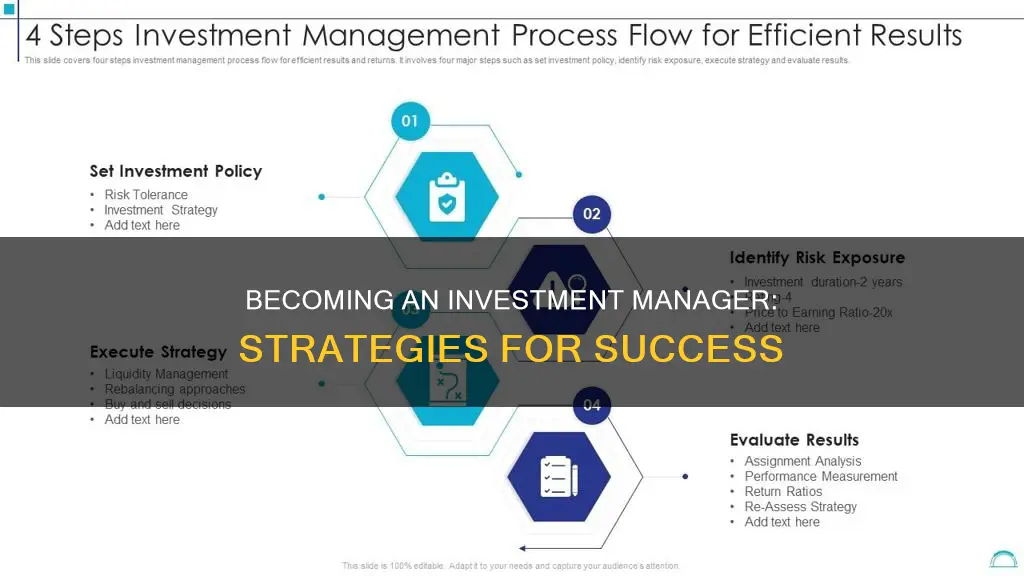
Investment managers are responsible for overseeing and managing investment funds, such as mutual funds, pension funds, or hedge funds. They develop investment strategies, conduct financial analysis, and recommend appropriate courses of action. To become an investment manager, you'll need a combination of education, experience, and skills. Obtaining a bachelor's or master's degree in a relevant field such as finance, economics, accounting, or business administration is typically the first step. From there, gaining relevant work experience in entry-level positions in the financial industry, such as financial analyst or portfolio manager roles, will provide valuable knowledge of financial markets and investment strategies. Building a track record of successful investment performance is key to advancing in this career, along with networking and establishing relationships within the industry. Professional certifications, such as the Chartered Financial Analyst (CFA) designation, are also highly valued and can lead to positions with top employers.
| Characteristics | Values |
|---|---|
| Education | Bachelor's or Master's Degree in Finance, Economics, Accounting, Business Administration, or a related field |
| Work Experience | Entry-level positions in the financial industry, such as financial analyst, portfolio manager, or trader |
| Professional Certifications | Chartered Financial Analyst (CFA), Certified Investment Management Analyst (CIMA), Chartered Alternative Investment Analyst (CAIA), Financial Risk Manager (FRM), Certified Public Accountant (CPA) |
| Skills | Interpersonal communication, analytical thinking, strategic thinking, research skills, emotional intelligence, decisiveness, confidence, integrity, resilience |
| Network | Industry events, professional associations, and contacts with other financial professionals |
What You'll Learn
- Get a bachelor's degree in finance, economics, business administration or a related field
- Gain work experience in the financial industry
- Get a master's degree in finance, business administration or a related field
- Obtain professional certifications like CFA or CIMA
- Develop soft skills like communication, analytical thinking, strategic thinking and emotional intelligence

Get a bachelor's degree in finance, economics, business administration or a related field
Earning a bachelor's degree in finance, economics, business administration, or a related field is a crucial step towards becoming an investment manager. This typically takes around four years and provides a solid foundation of knowledge and skills needed for a career in investment management.
During your undergraduate studies, it is beneficial to take courses in business, economics, finance, accounting, and mathematics. These courses will give you a well-rounded understanding of economic principles, financial markets, and quantitative analysis, which are essential for making informed investment decisions.
An undergraduate degree in these fields will qualify you for entry-level positions in the financial industry, such as financial analyst, portfolio manager, or trader. These roles provide valuable experience in financial analysis, portfolio management, and investment strategies, allowing you to apply the theoretical knowledge gained during your bachelor's degree in a practical setting.
While a bachelor's degree is a fundamental step, many investment managers choose to further their education by pursuing a master's degree in finance, business administration, or a related field. This advanced degree provides an opportunity to gain more specialized knowledge and skills in investment management and can lead to more senior positions in the industry.
Therefore, obtaining a bachelor's degree in a relevant field is an essential step towards becoming an investment manager, offering both academic knowledge and the opportunity to gain practical experience through entry-level roles in the financial sector.
Are 5% Monthly Investment Portfolio Gains Achievable?
You may want to see also

Gain work experience in the financial industry
Gaining work experience in the financial industry is a crucial step on the path to becoming an investment manager. Here are some detailed instructions and guidelines to help you achieve this goal:
Understand the Industry and Job Roles:
Start by familiarizing yourself with the various roles within the financial industry. Research job descriptions for positions such as financial analysts, portfolio managers, traders, investment bankers, and financial advisors. Understand the qualifications, skills, and responsibilities associated with each role. This will help you identify the specific area you want to focus on and the expertise you need to develop.
Entry-Level Positions:
Most investment fund managers begin their careers in entry-level positions. These roles provide valuable knowledge and experience in financial markets, investment strategies, and risk management. Keep an eye out for job openings at investment firms, banks, or financial institutions. Apply for positions such as financial analyst, portfolio analyst, or trader assistant. These roles will give you a solid foundation in the industry and help you develop the skills needed for more advanced positions.
Develop a Strong Skill Set:
Investment management requires a diverse set of skills. Focus on enhancing your analytical, financial modelling, and investment strategy skills. Develop your proficiency in using relevant software and tools, such as Excel and other industry-specific platforms. Additionally, work on your communication and presentation abilities, as these are essential for interacting with clients and stakeholders.
Seek Internship Opportunities:
Internships are a fantastic way to gain hands-on experience in the financial industry. They allow you to apply your knowledge in a practical setting and build valuable connections. Look for internships with investment firms, banks, or financial departments of large corporations. An internship will not only provide you with experience but also help you develop a network of industry contacts that can be beneficial for future job opportunities.
Network and Build Relationships:
Networking is a vital aspect of the financial industry. Attend industry events, conferences, and seminars to meet professionals in the field. Join professional associations and online networks related to investment management. Building a solid network can open doors to future job opportunities and mentorships. Don't be afraid to reach out to professionals you admire and seek their guidance or advice.
Stay Informed and Adaptable:
The financial industry is constantly evolving, so it's important to stay updated on trends, news, and developments. Subscribe to industry publications, follow influential financial experts, and utilize online resources to expand your knowledge. Being adaptable and quick to learn new skills will make you a strong candidate for investment management roles.
Remember, gaining work experience in the financial industry is a gradual process. Be patient, stay persistent, and take advantage of any opportunities that come your way. Each step will provide valuable lessons and bring you closer to achieving your goal of becoming an investment manager.
Understanding the Makeup of a Modern Investment Portfolio
You may want to see also

Get a master's degree in finance, business administration or a related field
A master's degree in finance, business administration, or a related field is often required for those aspiring to become investment managers. This advanced degree builds on the knowledge gained during a bachelor's program and provides a more specialised understanding of investment management. It is a crucial step in developing the expertise needed to handle complex financial matters and make informed investment decisions.
Pursuing a master's degree in finance or business administration typically involves a range of advanced courses. These courses delve into topics such as financial analysis, investment theories, portfolio management, risk management, and quantitative analysis. For instance, some programs offer stock market-specific courses, enabling students to gain practical knowledge and skills in equity research, investment strategies, and portfolio construction.
Master's programs in these fields often include a mix of lectures, seminars, and hands-on learning experiences. Students may have the opportunity to apply theoretical concepts to real-world scenarios, analyse case studies, and even participate in internships or industry projects. This practical exposure allows students to develop their analytical, decision-making, and problem-solving skills, which are essential for a career in investment management.
Additionally, a master's degree can provide valuable networking opportunities. During their studies, students can build connections with faculty members, industry professionals, and peers who share similar interests and aspirations. These connections can be instrumental in securing future internships, job referrals, or mentorship opportunities.
The advanced knowledge and skills gained through a master's degree in finance or business administration can significantly enhance an individual's credentials and employability in the field of investment management. It demonstrates a strong foundation in financial concepts, analytical proficiency, and a commitment to professional development, making candidates more attractive to potential employers.
Overall, obtaining a master's degree in finance, business administration, or a related field is a crucial step for aspiring investment managers. It equips them with the specialised knowledge, technical skills, and industry connections needed to succeed in this challenging and competitive field.
Saving and Investing: Your Guide to Financial Freedom
You may want to see also

Obtain professional certifications like CFA or CIMA
Obtaining Professional Certifications
Professional certifications are essential qualifications for aspiring investment managers. Two of the most prominent certifications in the field are the Chartered Financial Analyst (CFA) and the Certified Investment Management Analyst (CIMA) designations. These certifications provide recognition of expertise in investment analysis, portfolio management, and ethical standards.
The CFA credential is globally recognised and signifies a comprehensive understanding of investment principles. It is offered by the CFA Institute and requires candidates to pass three levels of rigorous examinations. In addition to the exams, the CFA Institute mandates a minimum of 4,000 hours of work experience, gained over at least three years. The curriculum covers a wide range of topics, including accounting, ethical and professional standards, economics, portfolio management, and securities analysis. CFA charter holders often work as analysts in institutional money management and stock analysis, providing research and ratings on various investment options.
On the other hand, the CIMA certification, offered by the Investments & Wealth Institute (formerly known as the Investment Management Consultants Association), focuses on investment management, asset allocation, ethics, due diligence, and performance measurement. CIMA candidates must pass an exam and meet specific experience and education requirements. This certification is designed for investment consultants with a minimum of three years of professional experience, and it emphasises consulting expertise in financial advisory roles. CIMA-certified professionals often work in financial consulting firms, interacting extensively with clients and managing substantial accounts.
Both the CFA and CIMA designations are highly regarded in the investment industry and provide strong credentials for aspiring investment managers. These certifications not only validate one's knowledge and skills but also demonstrate a commitment to ethical standards and ongoing professional development.
Diversifying Your Portfolio: Optimal Number of Investments
You may want to see also

Develop soft skills like communication, analytical thinking, strategic thinking and emotional intelligence
Developing soft skills is an essential part of becoming an investment manager. Here are some ways you can improve your communication, analytical thinking, strategic thinking, and emotional intelligence:
Communication Skills
- Learn to summarise complex issues clearly and concisely. Practice explaining complex investment topics in a simple and easy-to-understand manner.
- Tailor your communication to your audience's technical level. Adapt your language and level of detail to ensure effective communication with both retail and institutional clients, IT professionals, research teams, and peers.
- Develop empathy and rapport-building skills. Focus on "reading" people to understand their perspectives and build strong connections, especially in client-facing roles.
- Cultivate resilience and maintain a logical argument under pressure. This skill is valuable when influencing internal investment debates or making portfolio recommendations.
- Hone your ability to ask insightful questions. Seek to understand company insights and gather essential information.
Analytical Thinking Skills
- Improve your ability to break down information and understand its individual parts. This skill will help you make informed decisions and solve complex problems.
- Determine causation and examine similarities, differences, and relationships within the data. Look for patterns, trends, and conditional statements to make informed decisions.
- Enhance your critical thinking skills by evaluating evidence, asking questions, and considering multiple points of view.
Strategic Thinking Skills
- Ask strategic questions to exercise your planning skills and identify opportunities. For example, consider how your organisation can strategically position itself to enter a new market.
- Observe and reflect on your current situation to ground your strategies in facts. Gather information through interviews, market research, and data analysis to make informed decisions.
- Consider opposing ideas and question your assumptions. Playing devil's advocate can help strengthen your arguments and identify potential weaknesses.
- Embrace formal training to develop your strategic thinking skills further. Online courses and workshops can provide structured guidance and accelerate your development.
Emotional Intelligence
- Self-awareness: Develop a deep understanding of your own emotions and how they influence your decisions.
- Handling emotions: Learn to manage your emotions effectively, especially in stressful situations.
- Motivation: Set specific goals and work towards achieving them. Break down large goals into smaller, achievable steps.
- Empathy: Strive to understand the emotions and perspectives of those around you, including clients and colleagues.
- Social skills: Cultivate strong collaboration and communication skills to build positive relationships and work effectively in teams.
Invest Your Savings Wisely: A California Guide
You may want to see also
Frequently asked questions
A bachelor's degree in finance, economics, business administration, accounting, or a related field is generally the minimum requirement. However, master's degrees in finance or a related field are becoming more common.
Professional certifications such as the Chartered Financial Analyst (CFA) designation, Certified Investment Management Analyst (CIMA), and Chartered Portfolio Manager (CPM) are highly valued and often expected by top employers.
Most investment managers start their careers in entry-level positions in the financial industry, such as financial analysts, portfolio managers, or traders. This experience provides valuable knowledge of financial markets, investment strategies, and risk management.







